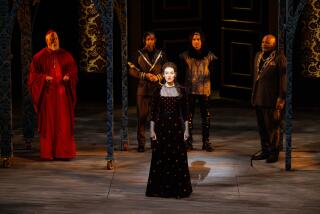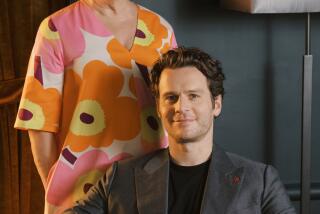Stratford festival gets musical
Antoni Cimolino and Des McAnuff, the duopoly in charge of the beloved Stratford Shakespeare Festival, began their annual letter to patrons with a fervent declaration: “Shakespeare is at the center of our dramatic universe.” True, this charming and hospitable Ontario town has hosted North America’s most prominent, classically based theater for more than half a century. But like all savvy administrators, Cimolino and McAnuff are also doing some get-ahead-of-the-story damage control.
In fact, Shakespeare is noticeably less at the center of the Stratford universe in 2009. This year, it’s mostly about the musicals.
In 2008, Stratford produced five Shakespearean productions; this year, it is producing three. Last year, none of the musicals was in the main Festival Theatre, the showcase venue. This year, director Gary Griffin’s intensely moving production of “West Side Story” is the marquee, top-selling production there. And whereas last year’s musicals felt like no more than solid regional productions, this year’s boffo pair of tuners, “West Side Story” and “A Funny Thing Happened on the Way to the Forum,” are richly innovative affairs, respectively packed with great emotional power and side-splitting shtick.
With the help of his choreographer, Wayne Cilento ( “Wicked”), McAnuff mines more sight gags during “ Comedy Tonight” than you’d have thought possible in a single opening number.
And in terms of delivering heart, truth and sexual intensity, Griffin’s beautiful, gut-wrenching “West Side” is far, far superior to Arthur Laurents’ current Broadway revival.
And the Shakespeare?
“A Midsummer Night’s Dream” opens this summer. And “Macbeth” and “Julius Caesar” have their arresting moments, especially those involving the Canadian star Colm Feore’s compelling Thane of Cawdor. But this pair of shows is strangely similar in conceit (both involve a lot of combat fatigues and gunshots). And although “Macbeth” is the better of the two by far, neither is able to forge a cohesive worldview or to carry its conceptual ideals to a fully satisfying conclusion.
Government funding
There are good financial reasons for a shift in focus -- that clearly has been pursued with great caution, this being Stratford, where every programmatic decision is parsed by dedicated American and Canadian theatergoers who’ve been coming every summer for years.
Last year, the mercifully well-endowed festival ran an operational deficit of $2.6 million and saw a 4% decline in attendance. Its leaders blamed the sour economy, especially in the Midwestern markets that traditionally provide the bulk of the festival’s pivotal U.S. audience.
As a result, 11 employees were laid off in early 2009. And in early April, the heavily unionized festival said it was going to put several of its scheduled performances “on hold” because of weak box-office demand, especially from the U.S. side of a border that, effective June 1, requires a passport to cross.
But aptly enough, there was a deus ex machina.
Just a couple of weeks after that announcement, the Canadian government announced its unprecedented and hastily conceived Marquee Tourism Events Program, an economic stimulus package that delivered $3 million to Stratford’s coffers. (The smaller Shaw Festival in Niagara-on-the-Lake got more than $2 million in stimulus funds.) Notably, this wasn’t traditional funding from the cultural-support wing of the Canadian government but from the Canadian minister with a responsibility for cultivating Canadian businesses.
The funds came with the caveat that they be used to attract new visitors, and the festival quickly reinstated most of its canceled shows and beefed up advertising in Canadian and U.S. newspapers.
A festival spokesman said last weekend that the effect of all those government-funded marketing endeavors had been large and immediate, stemming the decline in attendance and bringing cheer to a hitherto nervous town utterly dependent on visitors to a multivenue festival that runs from June through October.
The visitors are surely enjoying “West Side Story.” The metallic and deeply imaginative set from Douglas Paraschuk -- Doc’s drugstore is a streamline sight to behold -- allows Griffin to forge some gorgeous transitions, including a show-stopping moment when gently illuminated dressmaker’s dummies slide into place from the rear of the theater.
Griffin and his choreographer, Sergio Trujillo (“Jersey Boys”), use the thrust stage to magnificent effect, allowing the Jets and Sharks to propel themselves toward the audience, leaping in thrilling fashion to and from Paraschuk’s balconies and using the vomitoria as speed ramps.
But the real revelation here is in the intimate scenes, which ooze originality and passion.
Chilina Kennedy’s Maria is no nervous ingenue (as is the case on Broadway). Griffin doesn’t forget the character is still a child -- Maria disappears beguilingly under the bedclothes during the number “A Boy Like That.” But Kennedy’s Maria is also a gutsy young woman, who sets her face and fights tooth and nail for the boy she wants. And she sings the role flawlessly, as does her Tony, Paul Nolan.
Most important, Nolan and Kennedy spend the show locked in the kind of sensual connection that rivets an audience. In “Maria,” Nolan delivers the famous high note lying flat on the floor, his sound and passion carrying up to the rafters. It is an unforgettable moment.
Kennedy (who can also do comedy) is at the core of McAnuff’s laugh-a-second “A Funny Thing Happened on the Way to the Forum,” replete with a set from John Arnone that includes more tricks (singing gargoyles and the like) than a seaside fun house.
A cast of seasoned comic players, including the genial Bruce Dow (a Canadian Nathan Lane, only sweeter) and the hilarious “Slings and Arrows” star Stephen Ouimette, race from gag to gag. A plethora of comedic ideas in motion -- everything from life-size dolls (don’t ask) to a trampoline in the pit to houses that spin from one comedic reveal to the next. And the show even sports a Senex (Randy Hughson) who’s a dead ringer for Stephen Sondheim. What’s not to love about that?
Cyrano and Macbeth
Feore, the biggest name in this year’s festival and an actor of great integrity, plays the lead in “Macbeth” and in his wife Donna Feore’s lush, romantic interpretation of “Cyrano de Bergerac,” which features a gorgeous original score from the gifted and oft-overlooked Canadian composer Leslie Arden (“The Boys Are Coming Home,” which premiered at Northwestern University).
Colm Feore’s flamboyant nose takes a while to warm up (and Amanda Lisman’s Roxanne never fully catches fire), but once Feore’s Cyrano finds his stride, he becomes a sufficiently sophisticated and fleshed-out character that his tragic conclusion hits you with surprising emotional force. This is one of those classic, only-in-Stratford experiences, with florid emotions, grand production values (the battle scene looks like something out of “ Les Misérables”), a surety with Anthony Burgess’ text (although the show contains classy flourishes of Edmond Rostand’s original French) and moving performances from old Stratford hands such as Wayne Best.
“Macbeth,” also directed by McAnuff, takes more risks. It is supposedly set in mid-20th century Africa, although the show has a hard time deciding how specific it wants to get, especially when it comes to matters of race and class.
The production has plenty of pizazz and flash -- screens, military vehicles, another epic battle. And there are a number of engaging performances, including rich work from Geraint Wyn Davies as Malcolm and an arresting Lady M. from Yanna McIntosh, who seems to almost rub her skin raw as she requests that damn spot to leave her alone. Still, this feels like a radical conception that stared into the breech and decided to retreat rather than pushing harder for the other side.
James Macdonald’s “Julius Caesar” is also modern. In fact, the show gets more contemporary (and more visually confusing) as it goes along. The many problems with this production are typified by the little skirt-like garbs worn by the actors under their modern costumes -- a rather hackneyed suggestion, it seems, that Rome begat more Romes that followed. For that, we could have used our imaginations. Or read our newspapers.
Ben Carlson has his moments as Brutus -- a rather darker Brutus than is customary -- but the show mostly struggles to make internal sense, or to extrapolate its lessons of political betrayals for our own lives.
Five shows in a long Stratford weekend leaves work unseen -- other productions on the current slate include Oscar Wilde’s “The Importance of Being Earnest,” starring Brian Bedford as a gender-bending Lady Bracknell, and Bedford’s one-man show, “Ever Yours, Oscar,” featuring Wilde’s correspondence.
There’s also a rare revival of Ben Jonson’s “Bartholomew Fair.”
Jonson was no Shakespeare, of course.
Then again, Stratford is about the only noncollegiate professional theater on the North American continent that wouldn’t hesitate to do up old Ben. And the Canadian government has put its money behind its welcome.
Jones is drama critic of the Chicago Tribune.
More to Read
The biggest entertainment stories
Get our big stories about Hollywood, film, television, music, arts, culture and more right in your inbox as soon as they publish.
You may occasionally receive promotional content from the Los Angeles Times.










